Dear Friends,
An early hello this week because we all know that no one is opening this on Thanksgiving. But what will you be doing on Thanksgiving?
This year, I’m cooking with my mother-in-law. We both love to cook and may in fact be engaged in an unspoken cooking competition. It’s charming and I’m looking forward to it - and I’m also feeling conflicted, for several reasons.
First, despite not being a specifically religious holiday, Thanksgiving is marked on many church calendars. This is true in the Episcopal Church, despite the fact that almost a decade ago now, the National Church under Presiding Bishop Katherine Jefferts Schori, along with many other religious leaders, repudiated the Doctrine of Discovery. This was an important first step in reconciliation, but one which is simply not coherent with the fact that we continue to mark Thanksgiving as part of the Church calendar. We cannot reject the Doctrine of Discovery while acting as though Thanksgiving is joyful or even neutral. Especially in New England, where I live and where the historic myths surrounding Thanksgiving have their roots, every Thanksgiving stands in conflict with the National Day of Mourning, a protest led by the Wampanoag to raise awareness of both the historical and current struggles faced by Native Americans.
Some resources on the Doctrine of Discovery:
I love this timeline from the Beloved Community Initiative! It’s a little complicated for younger kids, but the primary sources included are great, especially for older elementary and middle school students.
This regularly updated Smithsonian Magazine article, “Do American Indians Celebrate Thanksgiving?” includes a lot of great information and resources.
Let American Indian voices dominate the sounds. Instead of skipping ahead to Christmas music or songs that glorify colonial America, try this playlist of American Indian artists.
Another reason that the way we mark Thanksgiving as people of God concerns me is because, though it may be less blatant than marking Independence Day, for example, Thanksgiving remains tied up with notions of Christian Nationalism, which I’ve written about here before. As Christians, we are called to a different kind of Thanksgiving, one that we celebrate every week, or even more often: The Great Thanksgiving. And that is a Thanksgiving that requires, as part of it, Repentance. How, then, do we make that a cornerstone of our Thanksgiving?
There are a number of things we can do to start changing our hearts on this topic and they don’t mean that you can’t gather with family or enjoy a good meal. They do, however, require being honest about how we arrived at the table:
Start with Honesty. I love this curriculum guide that addresses Thanksgiving from the Native American perspective. Developed by Oklahoma City Public Schools’ Native American Student Services, it’s full of facts, book recommendations, information on common myths and stereotypes, and other tools for breaking down the story we’ve all been taught and that your children may still be learning.
Emphasize Gratitude & Repentance. One of the most common things we do to mark Thanksgiving in our homes and even in our churches and Sunday School classrooms is to talk about what we’re thankful for. Discussing gratitude is always valuable, but particularly when it comes to Thanksgiving, that gratitude is inextricable from repentance. We cannot be grateful for the bounty of the earth, for example, without thinking about who that land rightfully belongs to or who might have been put in harms way for that food to be on our tables.
If your family is fortunate enough that no one is required to be at work (especially in a place like a retail store, rather than in a critical location like a hospital) so that you can all be together, that’s something extra to be grateful for and something that allows us to consider how we might demand more of our society for the benefit of all.Consider How You Pray. I did not grow up in a family that said grace every night, despite that fact that we ate dinner as a family every night. One thing I remember clearly about Thanksgiving, though, is that it was considered an opportunity to pressure the children present into praying aloud, like some kind of performance. It was okay if that prayer was the one we said at school or church, a rote, rhyming bit, as long as we were the ones who did it - but why?
Especially if your family doesn’t pray aloud much, or has a formula for prayer, this Thanksgiving ritual can be a place where adults start modeling prayer in one’ own words. Simply forcing children to be the ones who lead a prayer doesn’t foster meaningful communication with God. And, regarding the matter of repentance above, it’s an opportunity to pray in a way that is about more than gratitude.
As we prepare for Thanksgiving, it’s time to ditch the offensive stereotypes, the Doctrine of Discovery, and to demand more from our faith tradition. When we engage in practices like simultaneous repudiation of such doctrines and celebration of Thanksgiving, we participate in a performance of justice that only further harms our relationship with marginalized communities within our congregations and who we live alongside.
Gratitude and repentance are not exclusive practices. As Christians, we embrace them every single week as we approach the altar. We can walk in gratitude and repentance on this day, too, not ignoring the day nor fully reconciling the simplified, colonialist narrative in our hearts.
In Peace,
A. Bird





